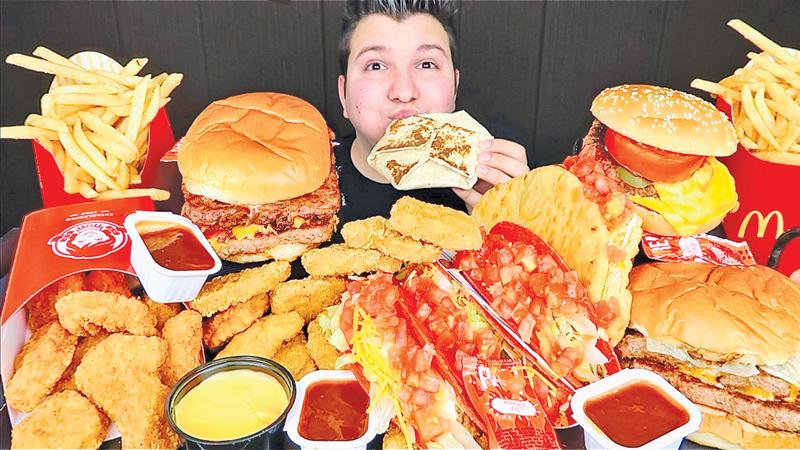
 The space of online streaming has always been a hotbed for strange trends that catch on like wildfire out of nowhere for seemingly no reason at all. One of the strangest trends that have found its place in the mainstream over the past decade has been videos of people simply eating food throughout the entirety of its runtime, sometimes interspersed with some narration from a host or in complete silence, with the only audio being the sounds of the host(s) eating.
The space of online streaming has always been a hotbed for strange trends that catch on like wildfire out of nowhere for seemingly no reason at all. One of the strangest trends that have found its place in the mainstream over the past decade has been videos of people simply eating food throughout the entirety of its runtime, sometimes interspersed with some narration from a host or in complete silence, with the only audio being the sounds of the host(s) eating.
These eating videos, called ‘Mukbangs’ have gone from being a small niche in South Korea, to an internationally viral juggernaut of a trend drawing in a multitude of sponsorships, endorsements as well as millions of viewers every day.
The origins of ‘Mukbang’ culture can be traced back to as early as 2008 on AfreecaTV, a South Korean based online streaming service, where it continues to be a massive part of today, amounting about 5% of its content. The word comes from a portmanteau of the Korean words for eating, ‘muk-ja’ and broadcast, ‘bang-song’.
These streams, called eating shows or EatCasts, allowed the hosts to interact with viewers while eating through the stream chats, but it’s not atypical to have pre recorded videos of people eating. The popularity of ‘Mukbang’ culture in South Korea was such that it has even bled into TV media, with dramas like ‘Let’s Eat!’, wherein the characters are drawn together over their love of food, with a lot focus being given to eating.
However, Mukbang’s primarily drew most of their popularity online, especially on massive international streaming platforms like YouTube and Twitch, which in turn led to greater international mainstream popularity. By 2016, the popularity of eating streams led to the introduction of a ‘Social Eating’ category on Twitch, which added some legitimacy to the trend and only served to massively grow its audience.
 Since then, Mukbang culture has been quickly adopted in many countries, most notably North America, China and Japan. Mukbang was even featured in the much reviled 2018 YouTube Rewind, and though the video itself is quite universally disliked, Mukbang being featured so prominently in a video perceived to reflect the space of YouTube in 2018 by YouTube itself, speaks to how popular Mukbangs had gotten.
Since then, Mukbang culture has been quickly adopted in many countries, most notably North America, China and Japan. Mukbang was even featured in the much reviled 2018 YouTube Rewind, and though the video itself is quite universally disliked, Mukbang being featured so prominently in a video perceived to reflect the space of YouTube in 2018 by YouTube itself, speaks to how popular Mukbangs had gotten.
Social bonding
The appeal of Mukbang varies greatly from person to person and culture to culture. For South Korean’s it is said that eating a meal is social activity and with an ever increasing number of South Koreans suffering from depression and loneliness, it is theorized that some are seeking out the parasocial interaction of watching and chatting with a streamer while eating. Even outside of Korea, a lot of people dislike eating alone and appreciate the feeling of social bonding they get from watching people eat.
For others, it is a form of ASMR, wherein people experience a pleasant auditory response from hearing sounds like chewing and swallowing. Some like watching people eat foods they have no chance to try in order to enjoy it vicariously. Those who are trying to diet also have claimed to use Mukbang videos to visually satiate their hunger. It is also difficult to ignore the sexual aspect to it, with some satisfying their fetish of watching attractive people, usually women, loudly eat copious amounts of food.
As can be expected of any internet trend, Mukbang culture also attracts a fair share of criticism, ranging from the superficial to legitimate health concerns. The general reaction to Mukbang content from those who don’t watch it themselves, if there is any at all, is usually one of disgust. Some find it revolting, and generally see it as some fetishistic genre of video, which while true for a portion of the community is not representative of the whole. One of the more serious concerns is its promotion of unhealthy eating habits. The average Mukbang video typically sees the host consuming massive amounts of mostly unhealthy foods, promoting binging and other eating disorders. Mukbangers themselves have to be careful about what they eat, as some, like the infamous Nikocado Avocado have cited their career as a Mukbang creator as the reason for his multitude of health issues and at least two other creators have been known to have died young, possibly due to their bad eating habits.
The waste of food is also a large point of criticism, as some Mukbangers tend not to eat most of the food prepared for the video, and some even spit out food, as they only bite and chew for the ASMR aspect. China has even taken action against Mukbang with laws being passed to ban binge eating videos.

